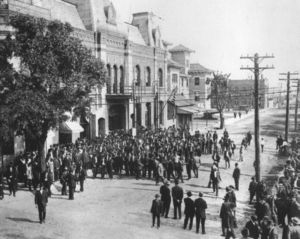The Pensacola Opera House was a 1,400-seat theater at the intersection of Jefferson and Government Streets, across from Plaza Ferdinand VII. Financed by timber magnate Daniel F. Sullivan, it opened on January 4, 1883. The building was heavily damaged in the two 1916 hurricanes and demolished after receiving further damage from the Hurricane of 1917. Salvaged bricks and balcony railings were used in the construction of the Saenger Theatre.
| Pensacola Opera House | |
 Crowd outside Opera House on Jefferson Street | |
| Building Information | |
|---|---|
| Location | Jefferson Street at Government |
| Client | Daniel F. Sullivan |
| Engineer | A.V. Clubbs, contractor Theodore Weber, artist |
| Completion Date | 1883 |
| Date Demolished | 1917 |
| Size | 1,400 seats |
The 1885-1886 Pensacola City Directory says the following of the Opera House:
- The Pensacola Opera House, Government cor Jefferson. R. F. McConnell, Manager, Sullivan's Wharf. This Opera House has two tiers above the main floor, is supplied throughout with opera chairs, and has a seating capacity of 1400 people. The stage which is 50 x 60 feet has 15 sets of scenery, foot-lights and four boxes. The rent is $100 per night.[1]
Contents
Guest Performers
Some of the performers who graced the Opera House during its existence include:
Bank
In addition to the theater itself, the Opera House also housed the Sullivan brothers' First National Bank, accessible through an entrance at the building's northwest corner. When that bank changed locations, the space was occupied by the American National Bank.
Pensacola Advertising Company
In 1902 then-owner John M. Coe created the "Pensacola Advertising Company," a small poster business to promote the opera house. He took a business partner, Charles W. Lamar, Sr., in 1905. When the two men dissolved their business relationship in 1908, the poster company went to Lamar and was renamed Lamar Advertising. According to Lamar company lore, "a coin toss was used to divide their assets," and Lamar "lost."[2] Of course, the opera house was destroyed eight years later, while Lamar Advertising went on to become a billion-dollar multinational.
References
- ↑ [1] Courtesy Janet Myers.
- ↑ Lamar Company History